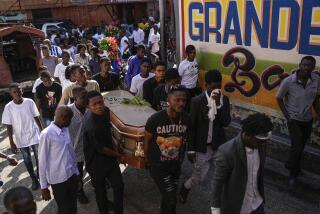A Wave That Washes Over All Haitians
- Share via
In December I heard from the Haitian novelist Lyonel Trouillot that a death list on which his name was included had been found in proximity to a severed human head. All month the situation in Haiti had been deteriorating, since the trigger point of the violent suppression of a student protest Dec. 5 in which the campus of the national university of Haiti had been invaded by gangs claiming to act in the name of the ruling party, Lavalas, and President Jean-Bertrand Aristide. In the melee, the university’s rector was crippled in both legs from a beating with an iron bar. Protests surged from all sides of a deeply and bewilderingly divided opposition, and the violence now directed toward a coup d’etat in Haiti was beginning to swell. Why, amid so much confusion and danger, would anyone bother to threaten a literary novelist?
Trouillot’s most recent book, “The Children of Heroes,” is a brilliant, biting allegory of Haitian history and at the same time a thoroughly realistic portrayal of the Haitian people today, trying to survive in the shadow of their own magnificent history. The Haitian Revolution -- in which slaves mostly born in Africa overthrew their masters, organized themselves to defeat the armies of England, Spain and France and created the first independent black state in the Western Hemisphere -- is and ought to remain an inspiration to everyone who fights for freedom anywhere.
Trouillot’s novel gives it a bleak and oblique presentation. Two children live with a long-suffering mother and an abusive father, who tells self-aggrandizing lies about his past and his present. When the children learn that his tales are false, they question the right he’s assumed to beat their mother senseless, and the next time he does it they trip him up and bludgeon him to death.
With their clothes still soaked with the blood of their father, the children flee into the capital, Port-au-Prince. For a couple of days, they survive as most people do in Haiti now, thinking only a few hours or minutes ahead, toward their most immediate and desperate needs for food, water and shelter. In the end, the children are captured in an eerie chase scene set in front of the National Palace and beneath the statues of the heroes of the Haitian Revolution.
Trouillot is not the only important artist to be threatened with death in Haiti today. Theodore “Lolo” Beaubrun, lead singer of the musical group Boukman Eksperyans, is another target. He joined Trouillot and many other artists and writers in December’s wave of public protests calling for the immediate departure of the current Haitian government. Which is ironic, for the music of Boukman Eksperyans also fueled resistance to the military junta in 1991; like Aristide himself, Beaubrun and his family and band mates spent the mid-1990s in exile. Days after the December demonstrations in which Lolo was prominent, a squad of hooded men occupied their house overnight, terrorizing family members while waiting for Lolo and his wife to return -- which they were cautious enough not to do.
In recent days, the demonstrations against the government have exploded into armed revolt -- an attempted coup d’etat is now in progress, its outcome uncertain. Equally uncertain is who is behind the armed revolt, whether there is any coherent organization behind it and what’s available to replace the current government if it is overthrown.
Haitian history holds too many unscheduled changes of government. Aristide was legitimately elected; to force him out of office before the end of his term, as the opposition is trying to do, is likely to further destabilize the country. The possibility now exists that Haiti may collapse into a state of perpetual civil war.
Death threats and assassinations against the opposition are unconscionable in a country that genuinely means to be democratic. But the present Haitian government does not appear to control the pro-Lavalas gangs with the totalitarian authority that the Duvaliers and the subsequent military junta held over their paramilitaries. So no one has been able to absolutely prove why or by whom certain free-speaking voices have been abruptly silenced: that of Jean Dominique, the journalist slain on the steps of Radio Haiti-Inter in the year 2000; or of his widow, Michelle Montas, who closed the station and left the country last year after an attack that killed her bodyguard; or of Brignol Lindor, the journalist killed by a mob in 2001.
The present government isn’t a dictatorship, and if it is more unable than unwilling to guarantee the security of civil society, it owes something to the United States for that, because after restoring the elected government, U.S. forces left Haiti prematurely, consummating the “exit strategy” at the price of abandoning the outgunned and undertrained Haitian National Police to forces the police could hardly hope to control.
The glory of the Haitian Revolution isn’t a lie. Nor are the goals and ideals with which Aristide and Lavalas began: an end to state terror; freedom of speech and the press; an empowerment of the people that would allow Haitians to make a transition from abject destitution to poverty with dignity.
Those were the purposes of Haiti’s second revolution, fulfilling the promise of the first. Reality, though, is better represented by Trouillot’s image of bloodstained fugitive children chased in a shrinking circle by an equally desperate mob, under the stone gaze of the statues of 200-year-old heroes.
“Depi tan nou endependan-an, kouman fe nou pako lib,” goes one of the myriad Haitian proverbs. “After all the time we’ve been independent, why are we still not free?”
Novelist Madison Smartt Bell is the author of “All Souls Rising” (Pantheon, 1995) and “Master of the Crossroads” (Pantheon, 2000).
More to Read
Sign up for Essential California
The most important California stories and recommendations in your inbox every morning.
You may occasionally receive promotional content from the Los Angeles Times.










